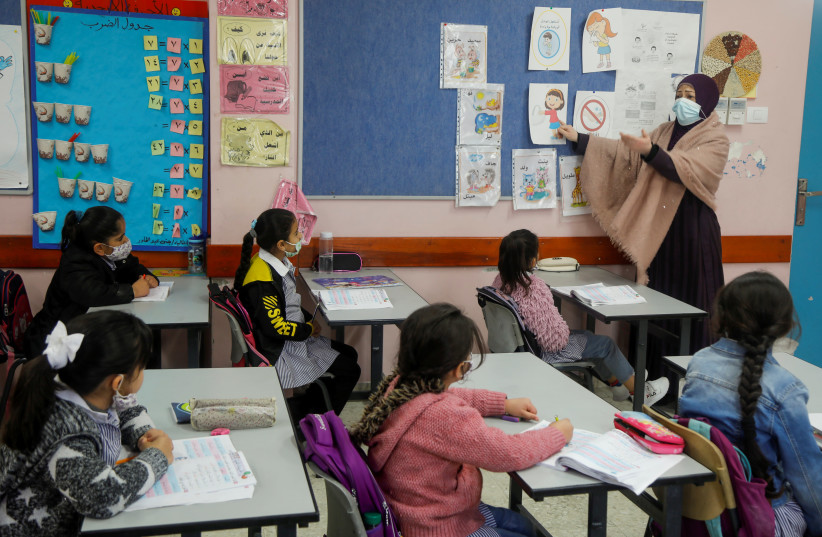Will UNRWA uphold its new policy against incitement?

The days of the US turning a blind eye to UNRWA policies are over.
On July 14, Philippe Lazzarini, commissioner-general of UNRWA, signed a new memorandum of understanding with the government of the US.
The revolutionary aspect of this document was that this was the first time that a donor nation to the UN Relief and Works Agency actually attached clear conditions to their financial participation in the UNRWA budget. Indeed, this development is a first in the history of UNRWA’s 72 years of existence.
Until 2018, when then-US president Donald Trump decided to freeze all funds to UNRWA, the US had been the largest UNRWA donor from the very inception of the UN agency.
Ever since the US administration in Washington changed, all eyes have been on US President Joe Biden – who made a campaign promise to find a way to restore financial aid to UNRWA.
In that context, the new US administration created new conditions for renewed US aid. The document reads as follows:
“Prior to the initial obligation of funds for the United Nations Relief and Works Agency (UNRWA), the Secretary of State shall report to the Committees on Appropriations, in writing, on whether UNRWA is –
(1) utilizing Operations Support Officers in the West Bank, Gaza, and other fields of operation to inspect UNRWA installations and reporting any inappropriate use;
(2) acting promptly to address any staff or beneficiary violation of its own policies (including the policies on neutrality and impartiality of employees) and the legal requirements under section 301(c) of the Foreign Assistance Act of 1961;
(3) implementing procedures to maintain the neutrality of its facilities, including implementing a no-weapons policy, and conducting regular inspections of its installations, to ensure they are only used for humanitarian or other appropriate purposes;
(4) taking necessary and appropriate measures to ensure it is operating in compliance with the conditions of section 301(c) of the Foreign Assistance Act of 1961 and continuing regular reporting to the Department of State on actions it has taken to ensure conformance with such conditions;
(5) taking steps to ensure the content of all educational materials currently taught in UNRWA-administered schools and summer camps is consistent with the values of human rights, dignity, and tolerance and does not induce incitement;
(6) not engaging in operations with financial institutions or related entities in violation of relevant United States law, and is taking steps to improve the financial transparency of the organization; and
(7) in compliance with the United Nations Board of Auditors’ biennial audit requirements and is implementing in a timely fashion the Board’s recommendations.”
The fact that aid to UNRWA must now meet the above conditions – for the first time – is not only a step in the right direction, it shows that the days of the US turning a blind eye to UNRWA policies are over.
Based on an examination of more than 1,000 texts published by the PA, there is not even one reference to the existence of Israel – even within its 1949-1967 ceasefire lines.
In one positive development, UNRWA said it would investigate 10 staff members at UNRWA schools over anti-Israel hate speech they posted on social media, highlighted in a report by UN Watch.
The question remains, though: What concrete steps can and will UNRWA take next to finally ban incitement from the rest of its text books. Textbooks which incite war against Israel are undoubtedly not in accordance with UN values and should accordingly be removed from the UNRWA curriculum, especially now that UNRWA has committed itself to resolutely combating any form of hate speech in its facilities.
When asked whether UNRWA is going to revise its curriculum in the course of this year, Tamara Al-Rifai, director of strategic communications for UNRWA, responded rather defensively, saying that “UNRWA neither has its own curriculum nor does it issue or print its own textbooks. In line with proven practice in education for refugees, UNRWA uses the host governments’ curricula to help children transition from UNRWA schools to local schools.”
She went on to clarify that this means that they will continue to use the PA’s school books in the UNRWA schools.
In other words, in the new school year, the inflammatory PA textbooks will still be used in UNRWA schools. If that remains the case, the anti-incitement memo that UNRWA signed will be rendered useless, unless the US and the other major donor nations step in and question the inciting content being taught in UNRWA schools. ■
The writer is the founder and director of Israel Resource News Agency and the Nahum Bedein Center for Near East Policy Research at Beit Agron in Jerusalem. He can be reached at dbedein@IsraelBehindTheNews.com
Jerusalem Post Store
`; document.getElementById("linkPremium").innerHTML = cont; var divWithLink = document.getElementById("premium-link"); if (divWithLink !== null && divWithLink !== 'undefined') { divWithLink.style.border = "solid 1px #cb0f3e"; divWithLink.style.textAlign = "center"; divWithLink.style.marginBottom = "15px"; divWithLink.style.marginTop = "15px"; divWithLink.style.width = "100%"; divWithLink.style.backgroundColor = "#122952"; divWithLink.style.color = "#ffffff"; divWithLink.style.lineHeight = "1.5"; } } (function (v, i) { });

